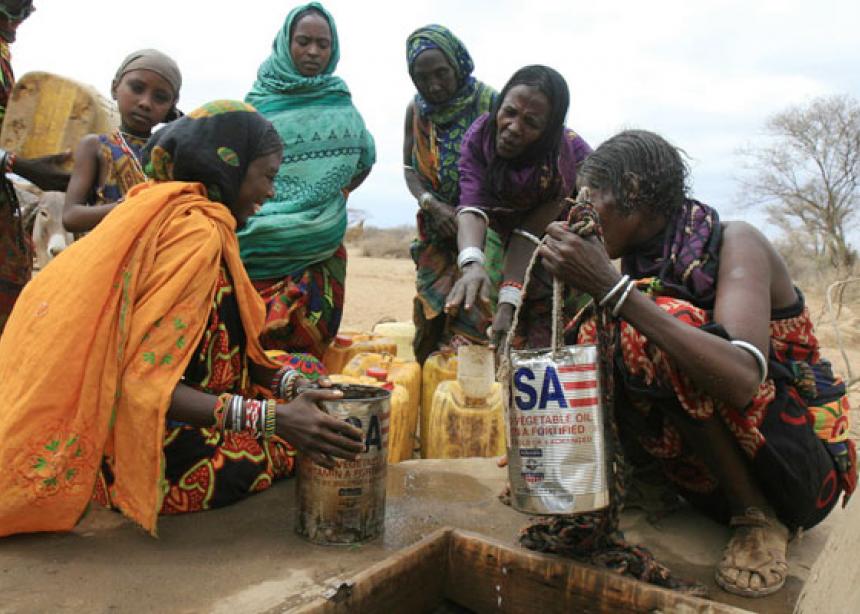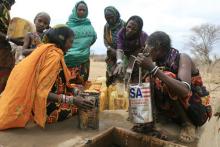In a January report, two major humanitarian agencies confessed that they, along with the rest of the world, responded too slowly to the food crisis in East Africa last year, and that thousands of people died unnecessarily. “How come, more than a generation after man walked on the moon, we would let fellow human beings die needlessly?” asks Jan Egeland, former UN Relief Coordinator, in the forward to the report.
The report, entitled “A Dangerous Delay,” was commissioned by Oxfam and Save the Children. It challenges us as Canadian Mennonites to examine the performance of agencies we support and to understand that responding to hunger is more complex than securing donations, loading maize on trucks in Africa and driving off to an arid village.
The report’s discussion of complexity and blunt admission of failure mark a deviation from the usual public storyline about food crises, which tends to go something like: hungry people urgently need our help, aid agencies responsibly and promptly distribute food bought with our donations, lives are saved and our backs get patted. There is often a twist—a corrupt government or war in the way—but the plot is relatively standard. And misleading.
Addressing food disasters is often a logistical and political puzzle. Many things can go wrong, as happened in East Africa.
In May, 2011 Dan Leonard predicted that the food crisis in Ethiopia, Kenya and Somalia would hit the news in three months and at that point aid agencies, including Mennonite Central Committee (MCC), would look back and wish they had acted sooner. Leonard is MCC country representative for Ethiopia, along with his wife Karin Kliewer.
The media came in July—led by the BBC—and only then was the international response jolted into high gear.
A full year prior, early warning systems began indicating trouble. Jim Cornelius, head of Canadian Foodgrains Bank (CFGB)—of which MCC is a member—said his organization received these warnings and discussed them with partners. Speaking from Ethiopia, where he was on a media tour, Cornelius said that by the end of 2010, the rains had clearly failed and concern was growing. The wheels of response were in motion, he said, but “before you know it, a few months drift by.” It was not until March 3, 2011 that the first CFGB (and MCC) funds were committed to the crisis. And it was not until mid-July, 2011—in the wake of the media blitz—that CFGB and MCC issued appeals for donations.
Famine is a slow-onset disaster, unlike an earthquake, which is sudden, dramatic and telegenic. This adds complexity. Cornelius says it is hard to muster a sense of urgency in the early stages because “things on the ground are not noticeably problematic at that point.” Unfortunately, “by the time they do become problematic, then you’re late.” All players, including head office staff in North America, need to be more responsive he says.
Urgency is critical, but Leonard, and Bruce Guenther, MCC’s disaster response director, emphasize that addressing hunger is about more than emergency response. Equally important are ongoing efforts to reduce people’s vulnerability to disaster. This is called “disaster risk reduction” and the “Dangerous Delay” report stresses it too. Manage risks in advance, it advises, instead of just managing the crisis when it hits. “Early action is more cost effective.” And it saves more lives.
Assisting people in their homes is cheaper and more effective than assisting them in camps, after they’ve sold or lost the animals and other assets that could provide a livelihood later.
And even before any signs of drought, efforts are needed to reduce risk. MCC’s long-standing work in Ethiopia on sand dams, forestation and soil and water conservation are a preventative element of its drought response. Drought will happen; rains will fail. But famine and starvation can be prevented if systems are in place to prepare people for lean times and assist them through those periods.
Despite the complexities of humanitarian assistance and the failures in East Africa, the death toll there—an estimated 50,000 to 100,000—was far lower than in the 1984 Ethiopian famine, in which nearly a million starved. Still, thousands of people died needlessly, largely people from Somalia where conflict and governance issues hindered the response.
With their report, Oxfam and Save the Children have emphasized the need to learn from the mistakes of 2011. They have also set an example by discarding the simplistic food aid narrative, and entrusting their supporters with a frank discussion of the complexities of their work.
Hard truth about hunger:
Report says thousands died needlessly in East Africa
February 15, 2012 | God at work in the World | Number 4
By Will Braun | Senior Writer
Bokayo Kanchoro collects water in Berena, Ethiopia, from an underground system filled with Oxfam tankered water. There are 3.2 million Ethiopians affected by the current drought and food crisis.
Share this page:






Add new comment
Canadian Mennonite invites comments and encourages constructive discussion about our content. Actual full names (first and last) are required. Comments are moderated and may be edited. They will not appear online until approved and will be posted during business hours. Some comments may be reproduced in print.